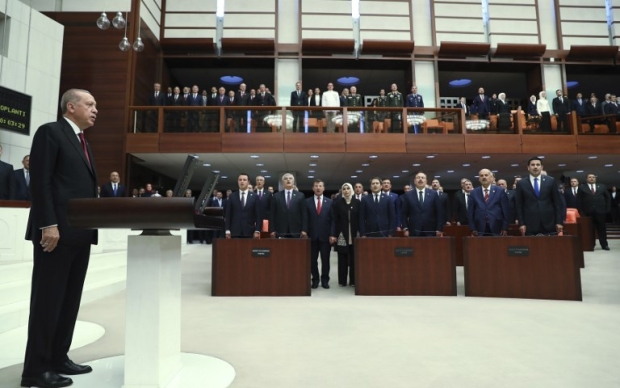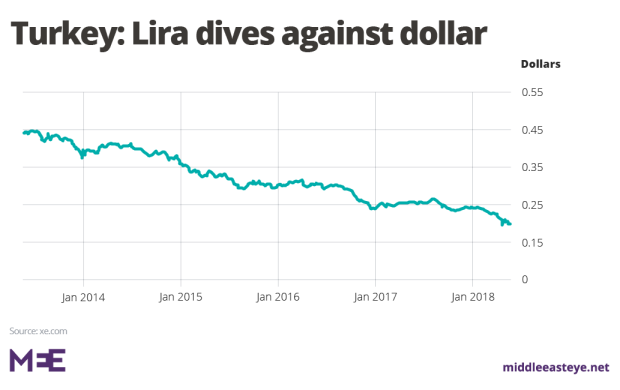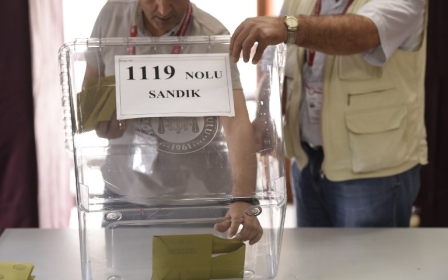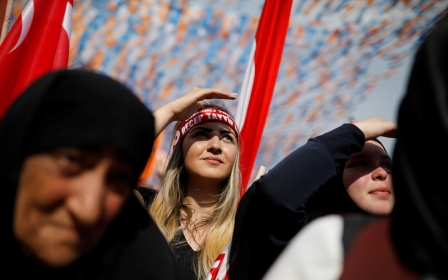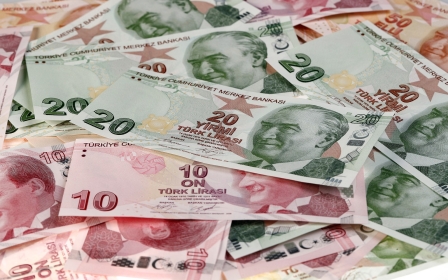Can Erdogan make Turkey 'great and powerful' again?
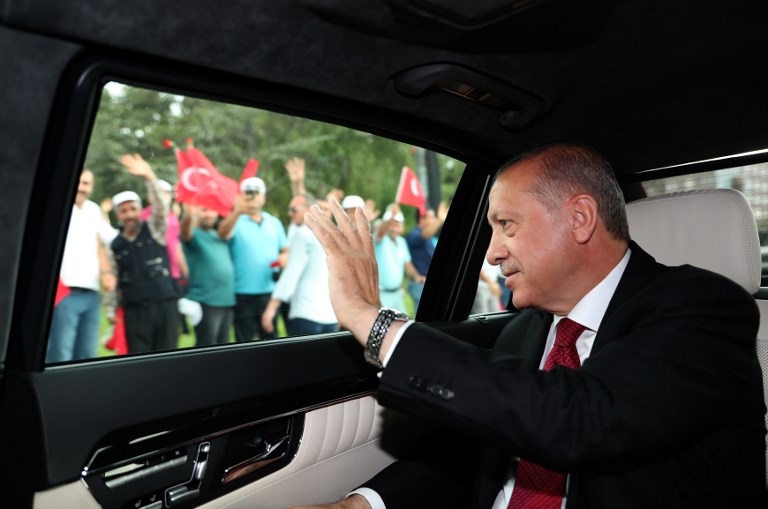
The inauguration of Turkey’s presidential system, and the swearing-in of Recep Tayyip Erdogan as the country's first plenipotentiary president on Monday, took place with the conscious grandeur befitting a country that believes it is once more destined to play a leading world role. It was a dazzling display, despite rainy weather in Ankara.
There were blue-jacketed presidential cavalry in attendance. The presidential luxury sedan was almost snowed under with rose petals and carnations as it carried Erdogan to parliament, and then on to the Mausoleum of Kemal Ataturk, the founder of the Turkish Republic. At the presidential palace, hundreds of high-ranking visitors sat in the open air and watched the president's inaugural speech.
By evening, it was clear that these events had not been simply ceremonial. A revolution in government had taken place, intended to be the biggest change in the country since the end of the Ottoman Empire and the proclamation of the republic in 1923. Its intention is to create a rapidly moving administrative machine, guided personally by the president, to ensure Turkey's place as a "great and strong country".
Three decrees
The upheaval in Turkey is more drastic than anything in the preceding 16 years since the ruling Justice and Development Party (AKP) came to power. Its effects will take many years to be revealed in full, but they will be felt in every area of the nation's life almost immediately.
An entirely new governmental system has been mapped out. Though the change was approved in a referendum in April 2017, it is only now that the specific details are becoming clear as arrangements are made. These were outlined in three decrees over the weekend.
Heads of government agencies have long privately complained that regulations have cramped them from carrying out reforms and innovations. Now, those restraints are gone
The country will now be ruled from the presidential palace at Bestepe by Erdogan via a set of boards that report to him. The boards will focus on areas including science, education, economics, security, law, culture and health, with a goal to speed up the process of government and brush away what is seen by the president and his lieutenants as a restrictive cobweb of complex departmental requirements.
Heads of government agencies have long privately complained that regulations have cramped them from carrying out reforms and innovations. Now, those restraints are gone. Positions such as ministry undersecretaries have been abolished, and departments such as directors-general have been scrapped or merged.
There will continue to be a Cabinet, but it will be a more pragmatic executive body than its predecessors, with only 16 members - and there will be no prime minister and no answerability to parliament. None of the ministers comes from the new Grand National Assembly, and ministers are no longer allowed to be MPs.
Little political background
In a few departments, there will be continuity. Three key ministers from the last government are being retained: Foreign Minister Mevlut Cavusoglu, Justice Minister Abdulhamit Gul, and Interior Minister Suleyman Soylu. In addition, the former energy minister, Berat Albayrak, who is also the president's son-in-law, becomes finance minister, while the chief of general staff, General Hulusi Akar, will become a civilian and take over the post of defence minister.
The AKP consequently numbers only 290 members in the 600-seat house. Apart from these names, the president has appointed a team with little or no background in politics or the civil service to run the government, suggesting that they will have little or no independence in policy-making.
Now that these changes have been made, where will President Erdogan take the country with them? Erdogan's stated overall aim is to make Turkey "greater and more powerful".
This seems to mean basically just an ever faster drive in the direction in which Erdogan wants. Last weekend, he repeated that operations in Syria and Iraq will be stepped up against areas controlled by the PKK (the radical militant Kurdish group fighting Turkey since 1984) and create a Turkish-controlled security zone in their place.
Inside Turkey, the drive to ever tighter presidential control over all institutions will continue. Rules that university rectors - who are appointed by the president - have to be professors, or that administrative judges must have a law degree were scrapped on Monday.
International markets will now be watching closely to see whether the new government takes measures to rein in inflation and bring the economy under tighter control
The squeeze on secular schools as opposed to Islamic ones and towards creating "a pious generation" will intensify.
There are strong hints too that there will be a crackdown on the opposition Republican People's Party if, as Erdogan suggested, its members continued to draw closer to the pro-Kurdish HDP. Despite its claims to reject violence, the government regards the HDP - whose leader has been in prison for nearly two years - as an offshoot of the PKK and thus guilty of terrorism.
Opposition party deputies deliberately snubbed the president by sitting through his oath-taking ceremony in parliament, defiance which he is unlikely to overlook.
While these measures will face little or no resistance inside Turkey, the government may be underestimating the international challenges its new policies may face in key areas such as the economy.
The appointment of Berat Albayrak, the president’s son in law, as finance supremo has gone down badly on world markets - as reflected by a fall in the Turkish lira against the dollar. It also caused concern among analysts and investors who were hoping that market-friendly faces among the previous team of ministers, such as Mehmet Simsek, former deputy prime minister, would be retained, but this has not happened.International markets will now be watching closely to see whether the new government takes measures to rein in inflation and bring the economy under tighter control. They will not necessarily find things going in that direction. Erdogan is strongly opposed to raising interest rates, which he believes cause inflation.
One of the myriad changes announced in the administrative decrees published in the last few days appears to restrict the autonomy of the central bank, the institution that has pressed hardest for a realistic interest rate policies to stem inflation, now at its highest in Turkey in the past 14 years.
Predictions unfulfilled
Meanwhile, some of the things that many observers predicted have not happened. The AKP has not given any ministries to its much smaller partner in the elections, the ultra-nationalist Nationalist Movement Party, and Erdogan has not favoured a senior figure as his deputy president. His trusty and ultra-loyal former prime minister, Binali Yildirim, is now president of the Grand National Assembly, an essentially honorific post. Albayrak was not made vice president either.
Instead, the post - ostensibly the second-most senior in Turkish government - has gone to a political unknown, Fuat Oktay, who for two years has served as undersecretary in the prime minister’s office. Oktay, who spent much of his life in private-sector administration, will be tasked with ensuring that the wheels of government run fast, and he will stay out of politics.
As for President Erdogan, despite a breathtaking agenda on Monday, he is working at an extraordinary pace. The morning after his inauguration, he left Ankara early on the first official visit of his new term, a journey to Turkey's "brother country" Azerbaijan. That visit over he flew on to Northern Cyprus to pledge Ankara's continuing commitment to the Turkish Cypriots. On Wednesday he will be at the NATO summit to meet US President Donald Trump and other NATO leaders.
- David Barchard has worked in Turkey as a journalist, consultant and university teacher. He writes regularly on Turkish society, politics and history, and is currently finishing a book on the Ottoman Empire in the 19th century.
The views expressed in this article belong to the author and do not necessarily reflect the editorial policy of Middle East Eye.
Photo: Turkish President Recep Tayyip Erdogan waves as he arrives to take the oath of office at the Grand National Assembly in Ankara on 9 July 2018 (Kayhan Ozer/Turkish President Office/AFP)
Middle East Eye propose une couverture et une analyse indépendantes et incomparables du Moyen-Orient, de l’Afrique du Nord et d’autres régions du monde. Pour en savoir plus sur la reprise de ce contenu et les frais qui s’appliquent, veuillez remplir ce formulaire [en anglais]. Pour en savoir plus sur MEE, cliquez ici [en anglais].



